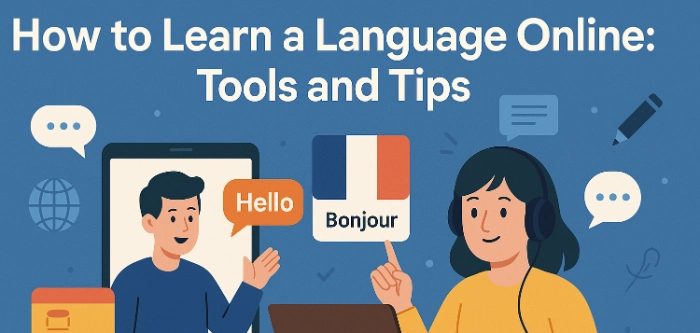How to Learn a Language Online

Tools and Tips
Whether you're a seasoned professional aiming for a promotion or a recent graduate stepping into a global job market, learning a new language can dramatically boost your career prospects. In today’s digitally connected world, mastering a new language is no longer confined to traditional classrooms. Thanks to the evolution of online learning and the accessibility of high-quality e-learning platforms like Udemy, edX, Coursera, and LinkedIn Learning, becoming bilingual—or even multilingual—is more achievable than ever.
In this guide, we’ll break down the most effective online courses, digital tools, and success strategies to help you learn a language online. We'll also explore how language learning can increase your value in the job market, supported by statistics, real-world success stories, and expert recommendations.
Why Learn a Language in the Digital Age?
1. Career Advancement
According to a 2024 report from the Economist Intelligence Unit, professionals who speak two or more languages earn, on average, 10–15% more than their monolingual peers. Roles in global marketing, sales, tech support, diplomacy, and project management increasingly require cross-cultural communication skills.
"Language is the gateway skill that opens global opportunities," says Cindy Blanco, a senior learning scientist at Duolingo.
2. Personal Development and Cognitive Growth
Studies published in Frontiers in Psychology show that bilingual individuals have improved problem-solving abilities, better multitasking skills, and greater cognitive flexibility—traits highly valued in professional environments.
3. Job Market Versatility
Learning a new language also unlocks freelance opportunities, remote roles, international relocation options, and even entrepreneurial ventures in translation, localization, or content creation.
Choosing the Right Online Language Learning Platform
When it comes to learning a language online, there’s no shortage of platforms. Here's how four of the most respected digital education providers compare:
1. Udemy
Pros:
Budget-friendly (often under $20 with sales)
Lifetime access
Niche languages and dialects
Top Courses:
“Complete Spanish Course: Learn Spanish Language | Beginners” by AbcEdu Online
“Japanese for Beginners” by Yuko Sensei
Best For: Independent learners who prefer self-paced study.
2. Coursera
Pros:
University-backed (Stanford, Yale, etc.)
Access to full specializations and certificates
Interactive peer forums
Top Coursera Courses:
“First Step Korean” by Yonsei University
“Learn Chinese: HSK Test Preparation” by Peking University
Best For: Professionals looking for structured, academic-style language learning with recognized certifications.
3. edX
Pros:
Ivy League credentials
Blended academic rigor and self-pacing
Audit options available for free
Popular Courses:
“Italian Language and Culture” by Wellesley College
“Mandarin Chinese for Business” by Hong Kong Polytechnic
Best For: Learners seeking in-depth language acquisition tied to culture, business, or travel.
4. LinkedIn Learning
Pros:
Career-focused application
Integration with LinkedIn profiles
Real-world examples for business and professional context
Language Content:
Though not as comprehensive as Coursera or Udemy, LinkedIn Learning offers niche communication courses such as:
“Business English for Non-Native Speakers”
“Intercultural Communication Skills”
Best For: Professionals improving workplace communication in a second language.
Beyond the Big Four: Other Niche Platforms
While Coursera, Udemy, edX, and LinkedIn Learning dominate, several other tools offer immersive or gamified learning experiences:
Duolingo (Free + Premium)
Gamified, habit-forming daily practice. Best for beginners.
Babbel
Focuses on real-life dialogues and conversation skills. Great for travelers and business professionals.
Busuu
Community-based corrections from native speakers and personalized study plans.
italki
One-on-one sessions with tutors. Useful for advanced learners.
How to Structure Your Online Language Learning for Success
1. Set SMART Language Goals
A vague goal like “learn Spanish” often leads to burnout. Instead, use the SMART framework:
Specific: “Learn 50 Spanish travel phrases.”
Measurable: “Achieve 80% comprehension on Duolingo tests.”
Achievable: “Study 30 minutes daily.”
Relevant: “Prepare for a job interview in Mexico.”
Time-Bound: “Reach A2 level in 3 months.”
2. Combine Passive and Active Learning
Passive learning (listening to podcasts, watching TV shows) helps with pronunciation and natural phrasing.
Active learning (speaking, writing, translating) builds fluency and confidence.
3. Use the “80/20 Rule”
Focus on the 20% of vocabulary and grammar that will be used 80% of the time in real-world conversations. This accelerates your learning curve.
4. Join Communities and Practice
Engage in:
Language exchanges (Tandem, HelloTalk)
Reddit communities like r/languagelearning
Meetup groups for language learners
Real-World Success Stories
From English Teacher to Multilingual Entrepreneur
Name: Alex Quinn
Story: A former high school English teacher, Alex, used Coursera and italki to learn Mandarin and Spanish. Within a year, he launched an online tutoring platform for bilingual learners and now earns 3x his previous salary.
Quote: “Online courses made language learning feel like a daily habit instead of a chore.”
Promotion Through Language
Name: Priya S.
Story: Working in customer support at a multinational tech firm, Priya took an edX “Business French” course. Within 6 months, she was promoted to European Accounts Manager.
Quote: “Learning French on my own time through digital education gave me a competitive edge.”
Data Speaks: Why Digital Language Learning Works
Here’s what the numbers show:
MetricTraditional LearningOnline Learning
Cost $500–$1,500 per course $0–$150 per course
Time Flexibility Fixed 24/7 Access
Retention Rate 8% (average classroom) 25–60% (e-learning)
Certification Options Limited Global accreditation
(Sources: Harvard Business Review, ResearchGate, Coursera Research)
Common Challenges & How to Overcome Them
1. Lack of Consistency
Solution: Use habit trackers and learning streaks (e.g., Duolingo’s streaks or Google Calendar reminders).
2. Fear of Speaking
Solution: Record yourself speaking. Join italki or Tandem for low-pressure practice with real people.
3. Burnout
Solution: Diversify your learning. One day use a podcast; the next day, take a quiz or watch a YouTube video in the target language.
Language Learning Tips from Experts
“Consistency trumps intensity. A learner who studies 15 minutes every day will beat one who studies 2 hours once a week.”
— Benny Lewis, founder of Fluent in 3 Months
“Digital immersion is the new frontier. You don’t need to move abroad to master a language—you need a strategy.”
— Olly Richards, polyglot and language coach
Goal | Recommended Tool |
|---|---|
Travel fluency | Babbel, Duolingo |
Business communication | LinkedIn Learning, edX |
Academic fluency | Coursera courses |
Advanced fluency | italki, Busuu |
Writing and grammar | Udemy, Grammarly (add-on tool) |
Final Thoughts: Why Online Language Learning Is the Future
We’re living in an era where digital education is reshaping global skills acquisition. From online courses that mimic college-level rigor to gamified mobile apps that make learning fun, the ecosystem for language mastery is more inclusive and effective than ever before.
For both seasoned professionals and recent grads, a second language is more than a résumé booster—it’s a career asset, a personal achievement, and a gateway to global connection.
Your Next Step
Want to explore more ways to upgrade your skills through online learning and e-learning? Visit ScoreThat.com for expert reviews, platform comparisons, and real-world insights into the best online courses available today.
Explore. Learn. Grow—with ScoreThat.

